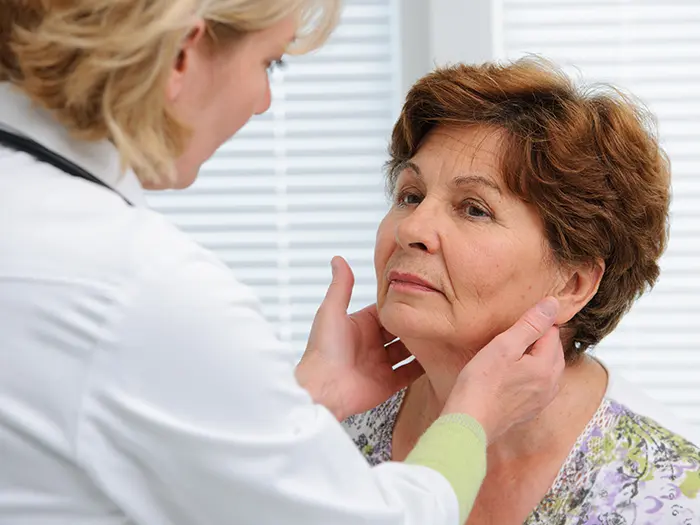Also known as underactive thyroid, hypothyroidism is a medical condition where the thyroid gland doesn’t produce enough thyroid hormones to keep the body functioning normally. It most commonly occurs in middle-aged women and can often coincide with menopause, producing similar symptoms that make it difficult to differentiate between the two conditions. Keep reading to explore the connection between menopause and your thyroid, including how these conditions can impact your body and when you should seek help from a doctor.
Understanding Menopause
Menopause is a natural biological process that marks the end of your menstrual cycle, preventing you from having children. Leading up to menopause, you’ll experience perimenopause, or the menopausal transition, which commonly occurs between the ages of 45 and 55 and can last anywhere from 7 to 14 years, depending on factors such as smoking, race and ethnicity. However, true menopause doesn’t begin until you stop getting a period completely. At this point, your estrogen levels drop, resulting in symptoms such as vaginal dryness and hot flashes.
Estrogen and Thyroid Functions
The decrease in estrogen levels experienced during menopause can also affect your thyroid function. Estrogen is the primary sex hormone in women and is responsible for developing and regulating the female reproductive system and sex characteristics. Meanwhile, thyroid receptors are molecules that allow thyroid hormones to enter cells.
A study published by the National Library of Medicine found that thyroid diseases are more prevalent in women between puberty and menopause, which may have to do with estrogen levels. Although more research is needed to better understand this connection, lower estrogen levels may affect thyroid levels, leading to thyroid disorders.
How Thyroid Disorders Can Affect Your Body
Thyroid disorders can cause the thyroid to produce too much or too little hormone, causing you to experience sleep or weight changes. These disorders most commonly occur after pregnancy or menopause. There are a few thyroid disorders women are more likely to experience than men, including:
- Hypothyroidism (underactive thyroid)
- Hyperthyroidism (overactive thyroid)
- Thyroiditis
- Thyroid nodules
- Thyroid cancer
Thyroid disorders can affect women differently, depending on what reproductive stage they’re in. For example, an overactive or underactive thyroid can affect ovulation and may even prevent you from ovulating at all. During pregnancy, thyroid disorders can harm the fetus and may cause the mother to experience thyroid issues, such as postpartum thyroiditis, after giving birth.
Thyroid issues can cause menopause to begin before 40 or in your early 40s. However, sometimes treating a thyroid disorder can ease symptoms of early menopause or prevent it from happening altogether.
Symptoms of Hypothyroidism and Menopause
On average, women experience menopause around age 51, but hypothyroidism can occur at any time. Because these conditions have overlapping symptoms, it can be difficult to tell them apart. Here’s an overview of symptoms commonly seen in menopause and hypothyroidism.
Symptoms of menopause include:
- Hot flashes and night sweats
- Trouble sleeping
- Difficulty learning or focusing
- Changes in energy or feeling fatigued
- Mood swings
- Lower urinary tract irregularities, such as frequent urination or excessive urination at night
- Body weight changes such as sudden weight gain
- Vaginal dryness and atrophy
- End of menstrual cycles
Symptoms of hypothyroidism include:
- Slower heart rate
- Increased sensitivity to cold
- Feeling persistently tired or fatigued
- Forgetfulness
- Increase in fat body
- Muscle or joint weakness
- Thinning hair
- Dry, chapped skin
- Sadness or depression
- High levels of blood lipids such as cholesterol or triglycerides
Test your Hormone Levels today
Long-Term Risks of Hypothyroidism
Thyroid disorders can also increase your risk of experiencing long-term complications associated with menopause. One common complication is osteoporosis, or loss of bone density, which can cause bones to become so weak and brittle that falling, bending or even coughing can result in a break.
Cardiovascular diseases can also result from menopause or low levels of thyroid hormones. Hypothyroidism can reduce your heart rate, but it can also make the arteries less elastic, causing your blood pressure to increase to circulate blood throughout the body.
When to See a Doctor
If you’re experiencing any of these symptoms, it’s important to consult a doctor and not just assume they’re due to menopause or hypothyroidism. A doctor can perform tests to determine which condition you have and the appropriate course of action. During your visit, your doctor will conduct a physical exam and ask questions about your health and medical history. Information you should be prepared to provide includes:
- Symptoms experienced
- Severity and duration of these symptoms and whether they’ve worsened over time
- Family history of endocrine disorders, especially related to thyroid disorders
- Menstrual cycle irregularities
- Eating habits
After the initial evaluation, your doctor may suggest diagnostic testing for further input.
Common Tests for Menopause and Thyroid Function
Menopause and hypothyroidism can be diagnosed with a simple blood test. Your doctor may check your levels for certain hormones associated with menopause, such as follicle stimulating hormones (FSH) and luteinizing hormones (LH).
FSH is responsible for inducing an egg’s maturation and ovulation in the ovary. As you age, your body requires more FSH to achieve this, meaning persistently high FSH levels can indicate menopause. High LH levels are also commonly found after menopause. This rise usually coincides with lower levels of estrogen and progesterone.
Your doctor may also conduct tests to check your thyroid function. These tests can include:
- Thyroid stimulating hormone (TSH): Your doctor may use this test to check TSH levels in your blood. When your thyroid is less active, your body produces more TSH, meaning above-average levels can indicate hypothyroidism, while below-average levels can indicate hyperthyroidism.
- T3 and T4: These are the main hormones your thyroid gland produces. High T4 levels can indicate hyperthyroidism, while low levels indicate hypothyroidism. However, T3 levels can be tricky because they don’t decrease significantly unless the condition is severe. If it doesn’t work, your doctor will likely try another test to check for hypothyroidism.
- Thyroid-stimulating immunoglobulin (TSI): This test measures TSI levels in your blood. High TSI levels can indicate Graves’ disease, an autoimmune disorder that affects thyroid function. This disorder is more commonly found in women than men and can cause symptoms of hyperthyroidism.
Test Your Hormone Levels Today
Symptoms associated with menopause or thyroid issues can be unpleasant and uncomfortable, but there are ways to reduce them and find relief. Hormone therapy can reduce symptoms of perimenopause and menopause by increasing estrogen and progesterone levels, which can also help with thyroid issues.
If you’ve been experiencing symptoms of either condition, Hormonally Balanced can help. Hormonally Balanced is a women’s health clinic serving the greater Boston area. We specialize in helping women navigate their midlife concerns, whether it’s issues with hormone levels or weight management, to improve their health and well-being. Contact us today to learn more about hormone therapy and see if it’s right for you.



